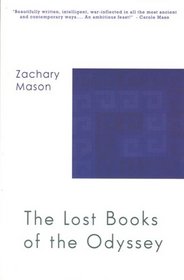Using short pieces which stand alone, the author tells the story of Odysseus As the tales unfold, one begins to realize that he was a complicated individual with his own fears, dreams and weaknesses.
Basically, this book is a retelling of Odysseu's life after the fall of Troy. The author states the book "seems to lend itself uniquely to...remixing, in that it's compelling." The contradictions found in short pieces lead sometimes to confusion and at others simply unveil a new vision of the story. I searched for an explanation from the author about the book's development but found none. Using the author's name I located an interview online. The interviewer clarified that these short tales are âversions of the Odysseus story that circulated in the time before Homer but were left out of the epic as we came to know it.â
Asked about Agamemnon's Fortress, the author replied that the structure of this segment is like a fairy tale with three elements - animals, questions, obstacles or whatever. âIt starts with Agamemnon's sense of helplessness; for all his armies and his heroes he can't take a single city, which leads him also to reflect on the extent of his ignorance, so he calls together his three wisest counselors and, not being one for half-measures, asks them to explain, essentially, everything in the world. Three times he asks them, and each time they come back with a denser and perhaps pithier solution, and with each iteration more time passes.â
Another interviewer question focused on the scene where the sand walls collapse. It seems that the Greeks implemented laws that forbid soldiers from excavating or uncovering anything that had been buried. The author stated: âI liked the idea that they would become trapped by their own superstitions: prevented from doing the rational thingâas far as planning wentâand obliged by this unfortunate belief to keep digging themselves in deeper.â
Among other segments discussed was Ilium, âdeath's city,â full of âuncountable mausoleumsâ and constructed from bones and the chess chapter defined as the âRecord of a Gameâ. In one tale a disguised Ulysses tells the story. However, can a person reliably enumerate their own actions? At times I found so many layers that I reread sections several times. I want to read The Iliad to more fully understand the tales that Zachary Mason has strung together to better know the meanings and his intentions. My rating reflects my desire to do so.
Basically, this book is a retelling of Odysseu's life after the fall of Troy. The author states the book "seems to lend itself uniquely to...remixing, in that it's compelling." The contradictions found in short pieces lead sometimes to confusion and at others simply unveil a new vision of the story. I searched for an explanation from the author about the book's development but found none. Using the author's name I located an interview online. The interviewer clarified that these short tales are âversions of the Odysseus story that circulated in the time before Homer but were left out of the epic as we came to know it.â
Asked about Agamemnon's Fortress, the author replied that the structure of this segment is like a fairy tale with three elements - animals, questions, obstacles or whatever. âIt starts with Agamemnon's sense of helplessness; for all his armies and his heroes he can't take a single city, which leads him also to reflect on the extent of his ignorance, so he calls together his three wisest counselors and, not being one for half-measures, asks them to explain, essentially, everything in the world. Three times he asks them, and each time they come back with a denser and perhaps pithier solution, and with each iteration more time passes.â
Another interviewer question focused on the scene where the sand walls collapse. It seems that the Greeks implemented laws that forbid soldiers from excavating or uncovering anything that had been buried. The author stated: âI liked the idea that they would become trapped by their own superstitions: prevented from doing the rational thingâas far as planning wentâand obliged by this unfortunate belief to keep digging themselves in deeper.â
Among other segments discussed was Ilium, âdeath's city,â full of âuncountable mausoleumsâ and constructed from bones and the chess chapter defined as the âRecord of a Gameâ. In one tale a disguised Ulysses tells the story. However, can a person reliably enumerate their own actions? At times I found so many layers that I reread sections several times. I want to read The Iliad to more fully understand the tales that Zachary Mason has strung together to better know the meanings and his intentions. My rating reflects my desire to do so.




